Shooting analogue with film cameras?
If you require the best 35mm film in the digital age, you probably have a special artistic application for this item. Each brand produces its own emulsion formula, which can give different shades for the same moments. Therefore, I suggest that you figure out in advance what exactly you are installing in the camera to match your vision.
Obviously, the results will depend on the type of camera and processing methods. But it is possible to evaluate several general characteristics of a color film. Check out my selection and run your own tests to find the film that meets your expectations best.
Film photography has seen a resurgence in recent years. Both experienced filmmakers and curious digital enthusiasts are eager to explore the magic of analog photography. While it is impossible to argue that digital cameras don’t provide greater clarity, detail and ease of use, that’s not why film photography has become popular again.
When technology is able to automatically fix on the eyes, and medium-format cameras are equipped with sensors in the hundreds of MP, it is possible to go back to the roots and enjoy the tactile property of film photography. But each film will have its own aesthetic, with differences in color, grain, contrast (like the instant color correction). In this article, I have collected the best 35mm films to get back to basics and enjoy the revolution in analog technology.
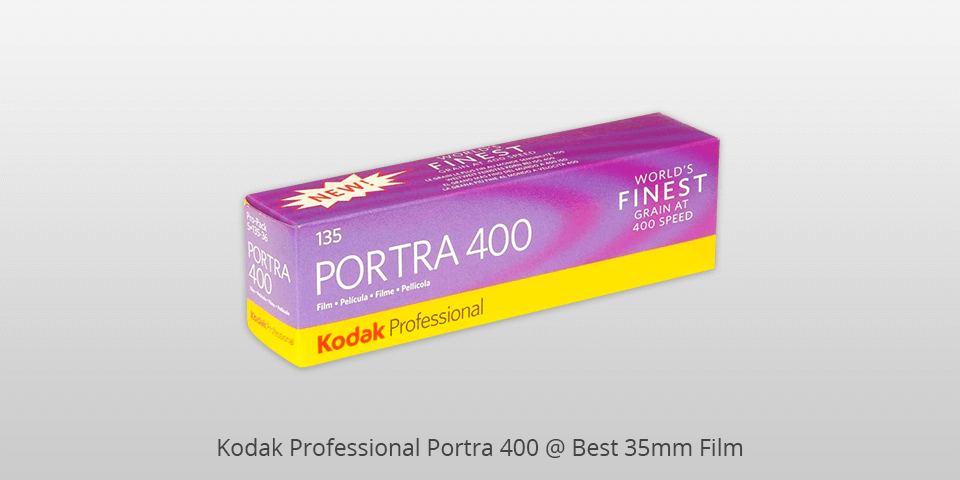
Color type: color negative | ISO equivalent: 400 | Exposures per roll: 36 | Chemistry process: C-41
The Portra 400 has gained popularity due to its reliable picture quality, flexibility in various conditions, excellent graininess and colors. This top-notch 35 mm film is calibrated for portrait photography, so all skin tones reproduce naturally and smoothly with a noticeable glow and a pleasantly flat profile.
The Portra 400 is notable for its color saturation and low contrast, providing overall warmth along with muted colors. Thanks to its awesome graininess, it is a versatile tool for landscape and other genres of photography, easily coping with exposure.
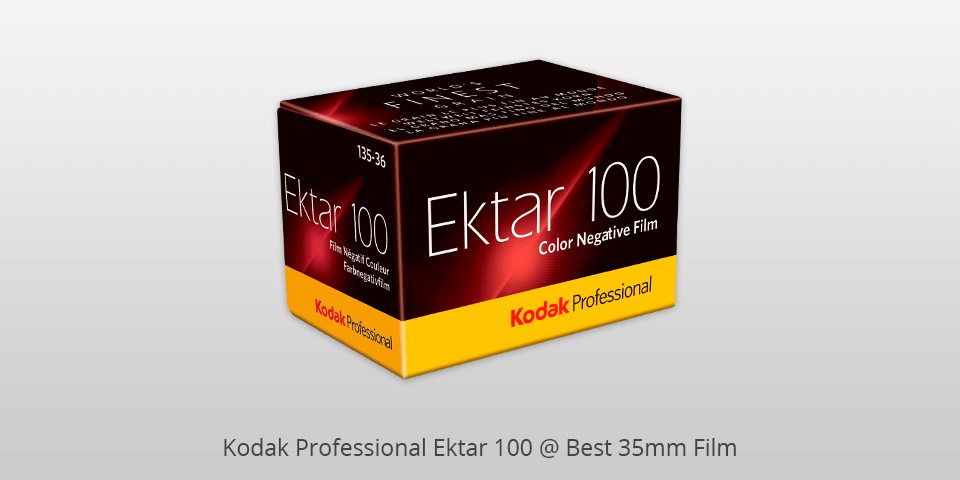
Color type: color negative | ISO equivalent: 100 | Exposures per roll: 36 | Chemistry process: C-41
Ektar 100 has the best grain thanks to T-Grain technology, which is notable for high saturation, sharpness and color reproduction, particularly red and green. This high-quality film lets you achieve clear shots for use with film scanners, magnification and printing.
Commercial photographers call it the best 35mm film for commercial shots. The Ektar 100 is able to reproduce vivid colors and dramatize shades in bright light, making shots visually appealing with high saturation and clarity, while maintaining a contrasting line. 100 ISO suggests light, but the sharpness is amazing, honing the main details in an interesting way.
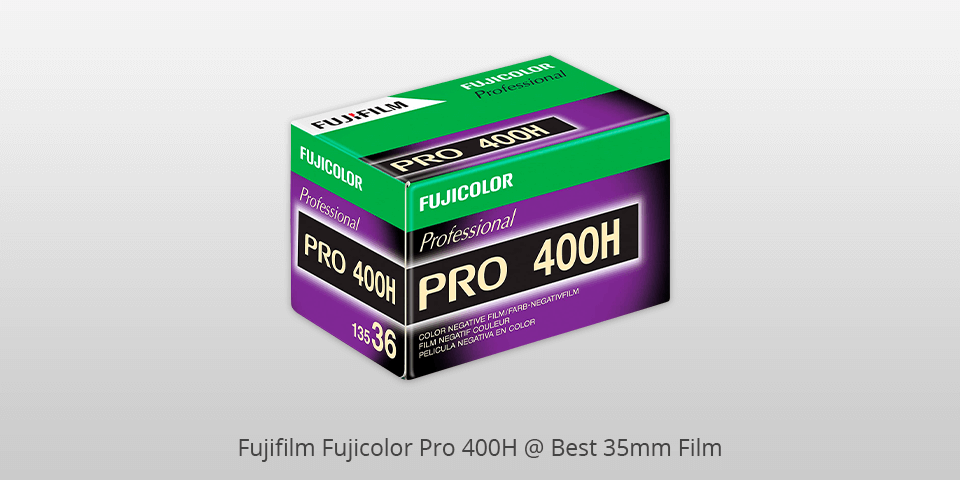
Color type: color negative | ISO equivalent: 400 | Exposures per roll: 36 | Chemistry process: C-41
If you are having a wedding or fashion shoot in a changing environment, it may be worth the compromise in quality. Intended for versatility and reliability, the Fujicolor Pro 400H is the best color film 35mm for wedding photographers, who wish to capture the rich details of skin tones, nature, and balanced highlights with shadows.
Analog photographers employ it for portraits with a real character. You can spot more grain than with slower emulsions, which can enhance the “analog” vibe. Fujicolor has a fine, noticeable grain, providing a feeling of softness and uniqueness. The greenery of this film creates a fabulous smooth texture that brings shots to life.
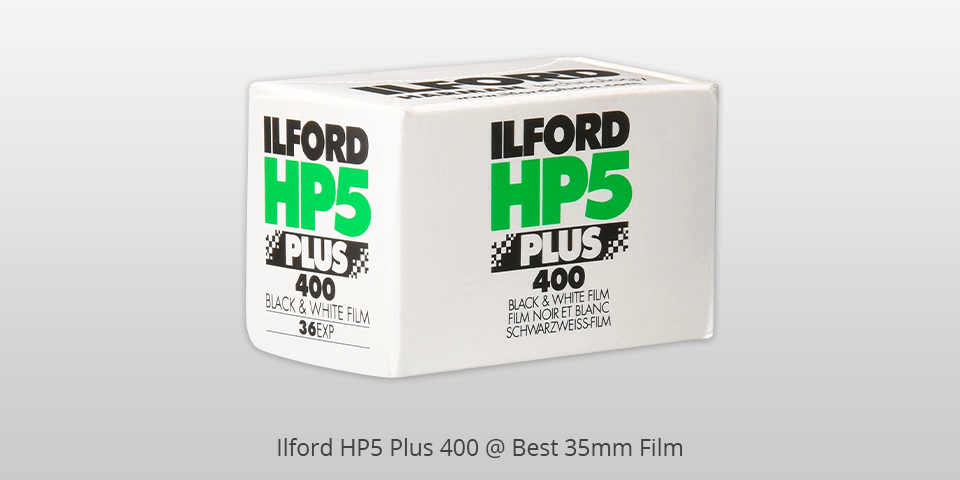
Color type: black and white | ISO equivalent: 400 | Exposures per roll: 36 × 2 | Chemistry process: black and white, gelatin-silver
If you are searching for a decent film roll 35mm to take black and white shots in a vast array of settings under different lighting conditions, Ilford HP5 is for you. The newest version of the classic fast film can be developed using standard black-and-white chemistry.
This is a nice all-rounder for those who wish to try monochrome or are after a film that is suitable for low-light processing. The amount of light variations that Ilford can pick up is amazing. You will get stunning high-contrast shots. Besides, the film is very gentle in low light, so amateurs can effectively employ it for harsh street photography.
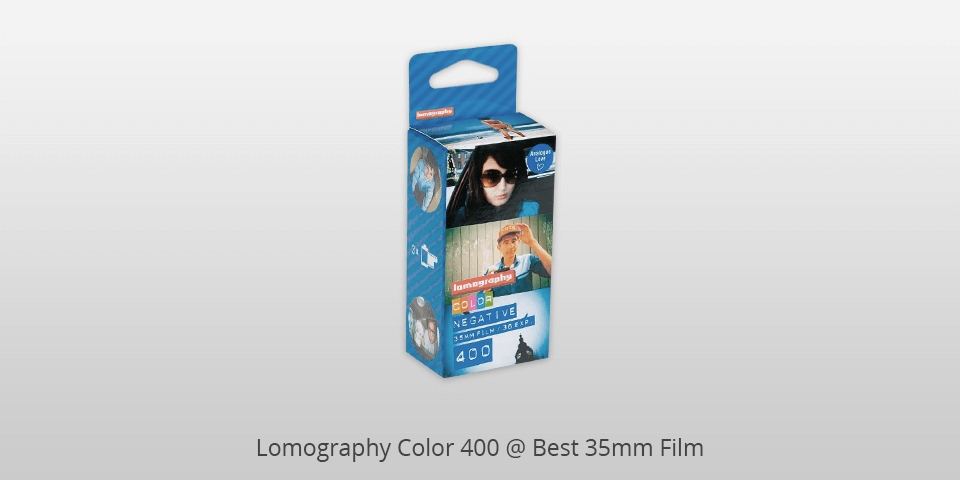
Color type: color negative | ISO equivalent: 400 | Exposures per roll: 36 × 3 | Chemistry process: C-41
For vintage old-school shots, the Lomography Color 400 is the best color film 35mm with a particular iconic status. The blend of high contrast, ultra-saturation with heavy black and sharp white tones, crazy bright colors and graininess doesn’t attempt to reproduce the real scene but reveals peculiar properties not seen before.
Lomography Film Color Negative 400 takes colorful, realistic shots in a vintage style. Moreover, it is sold at a reasonable price as an alternative to the Kodak Portra.
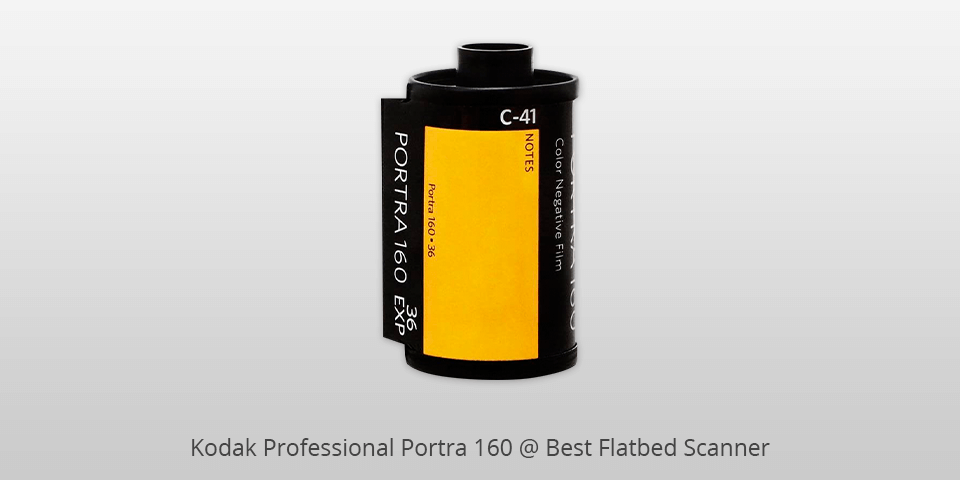
Color type: color negative | ISO equivalent: 160 | Exposures per roll: 36 | Chemistry process: C-41
The Portra 160 operates well in rough lighting conditions with a warmer shade, with very small grain and precise colors. You will have a fair amount of color detail in the light and dark areas, showing through the highlights and out of the shadows, since it isn’t as contrasting.
It is designed with fine grain for scanning and magnification in a digital workflow. This is one of the 35mm films of the Portra line, intended for smooth textures and natural skin tones – from portrait and fashion photography to product photography and commercial shoots.
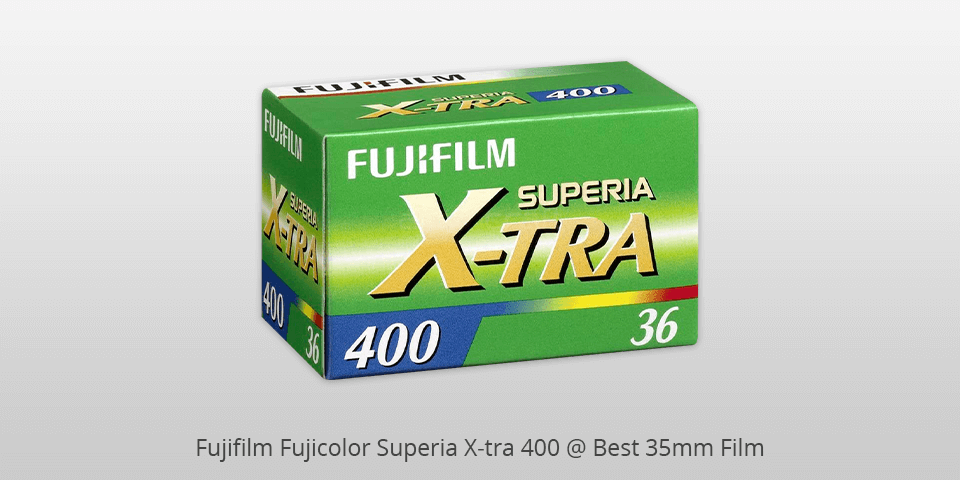
Color type: color negative | ISO equivalent: 400 | Exposures per roll: 36 | Chemistry process: C-41
This 35 mm film of the Japanese brand highlights greenish and purplish hues, resulting in a cooler effect. The Superia X-TRA 400 as a general-purpose universal film is a fine, tightly packed grain with pleasant clarity and reliability in different lighting conditions. Superia’s bright colors look beautiful in natural light, which is why street photographers love it.
Fujifilm has a strong consistency in creating a natural color balance, so the shots are rarely oversaturated. The Fujicolor X-TRA 400 is often used for urban living with the relative ease of shooting neon signs, car headlights and mixed lighting.
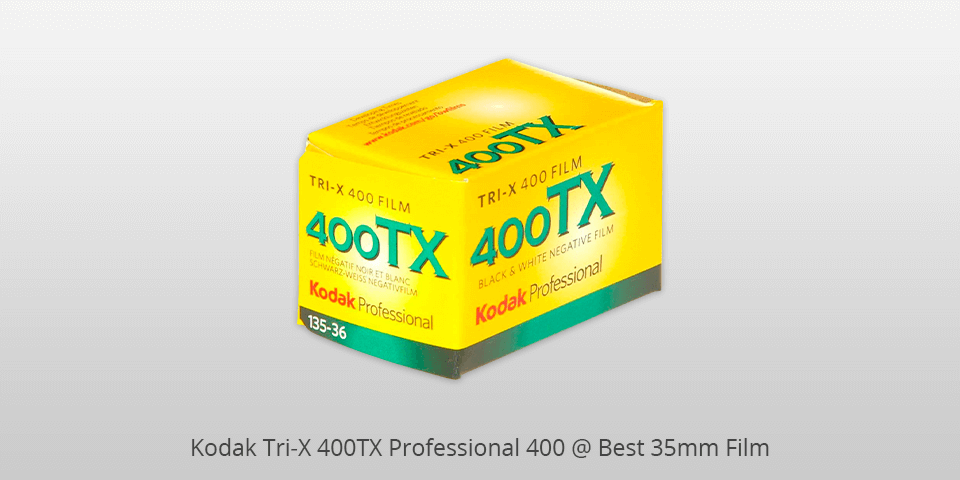
Color type: black and white | ISO equivalent: 400 | Exposures per roll: 36 × 3 | Chemistry process: black and white, gelatin-silver
The signature black and white Kodak is always there. Its simplicity of expression, beautiful grain structure, perfectly balanced contrast and stunning shadow detail mean it is unlikely to disappear. Renowned by a generation of documentary and military photographers, it is resistant to variations in exposure and processing, producing clear shots with sufficient detail.
The Tri-X is incredibly sharp and super-high-contrast, which makes it the best 35mm film for the speedy panchromatic shooting of poorly-lit objects or fast movements. The Tri-X will do the heavy lifting for you with its exaggerated black and detailed depth.
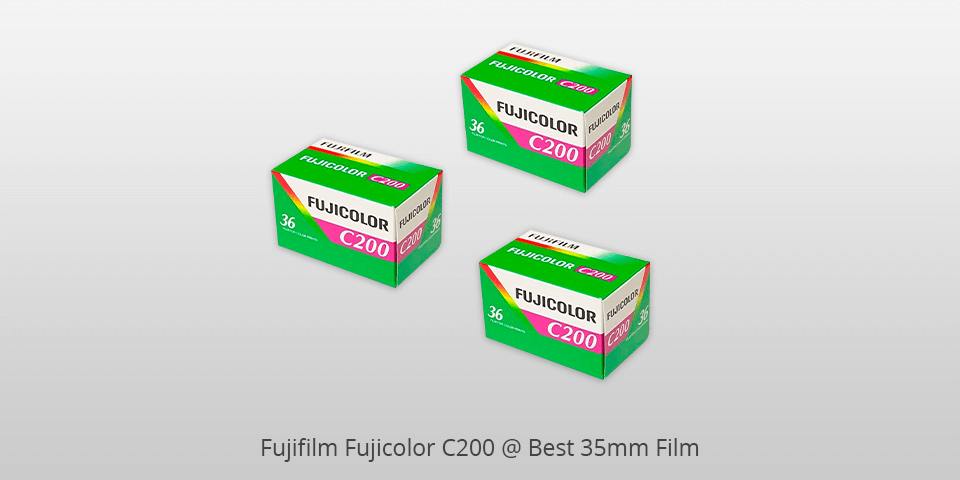
Color type: color negative | ISO equivalent: 200 | Exposures per roll: 36 × 3 | Chemistry process: C-41
This is the best low-cost consumer film roll 35mm that lets novices try new ideas and techniques without spending too much. The shots are pretty qualitative, although you won’t get the clarity of professional films, and it isn’t the go-to option for shooting indoors or in poor light.
It has an ISO 200 rating for shooting in well-lit rooms or bright open air. Green shades prevail, but sometimes purple tones are more noticeable. Fine graininess is visible, however, it isn’t distracting, letting you take clear and informative shots. Overall, the Fujifilm C200 is a nice alternative to Kodak for photographers on a budget.
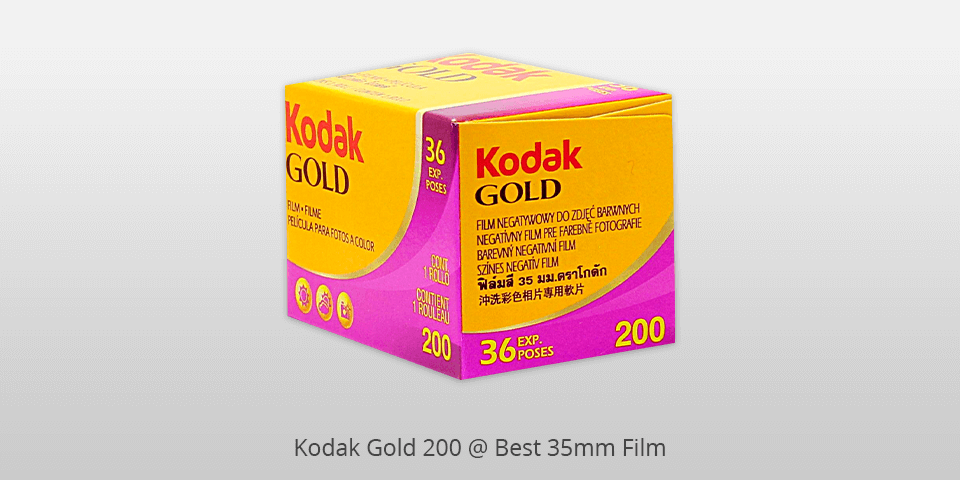
Color type: color negative |ISO equivalent: 200 | Exposures per roll: 36 | Chemistry process: C-41
This is the best 35mm film for any photographer on a tight budget. It is globally available and inexpensive, becoming one of the go-to choices for many. The lower ISO makes it suitable for harsh light and photographers who require an affordable option for warmer-hued shots.
The wide range of exposure compensates for the exposure of the frame. The signature warm and rich tones of the Gold 200 are perfect for nostalgic family shots, enlivening the vintage atmosphere. On sunny days, it provides rich, full colors.
| IMAGE | NAME | FEATURES | |
|---|---|---|---|

|
Kodak Professional Portra 400
OUR CHOICE
|
CHECK PRICE → | |

|
Kodak Professional Ektar 100
BEST VALUE
|
CHECK PRICE → | |

|
Fujifilm Fujicolor Pro 400H
FOR PORTRAITS
|
CHECK PRICE → |
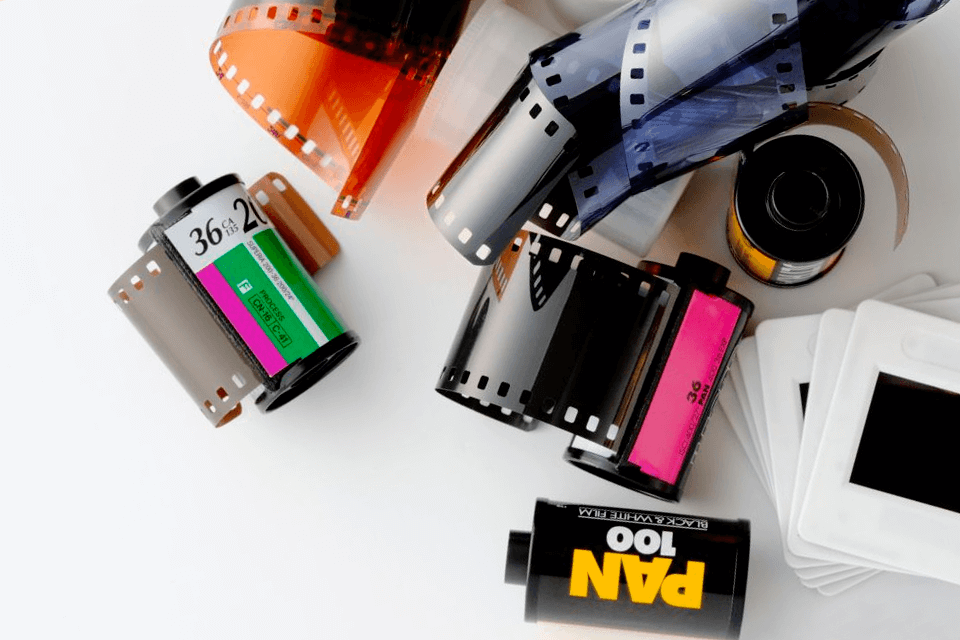
While picking a decent 35mm film, you should consider a few basic factors, including the types of 35mm film, such as color negative, slide, black and white ones. Also, think about the light sensitivity of the film (indoors or outdoors). Next, take into account the desired aesthetic. That’s where the comparison above comes to the rescue.
You will spot the speed index on the film package, for instance, 200, 400 or 800. This refers to the sensitivity of the film to light. The higher light sensitivity of film will let you take better shots indoors or in low light. But you may end up with a grainier shot.
A low ISO value indicates a lower light sensitivity of the film. These so-called low-speed films operate best in daylight to produce a smooth, fine-grained texture. But there may be problems if the light isn’t perfect. You will need a longer shutter speed to achieve the same exposure as on a high-value film.
A general rule of thumb is to start with 400, as depending on your lens, you can shoot under most types of light. But after dusk, you will need a flash. Another interesting point is that people don’t like the appearance of film in low light, because shooting a film at night can be a difficult task, and the selection of fast films is quite limited.
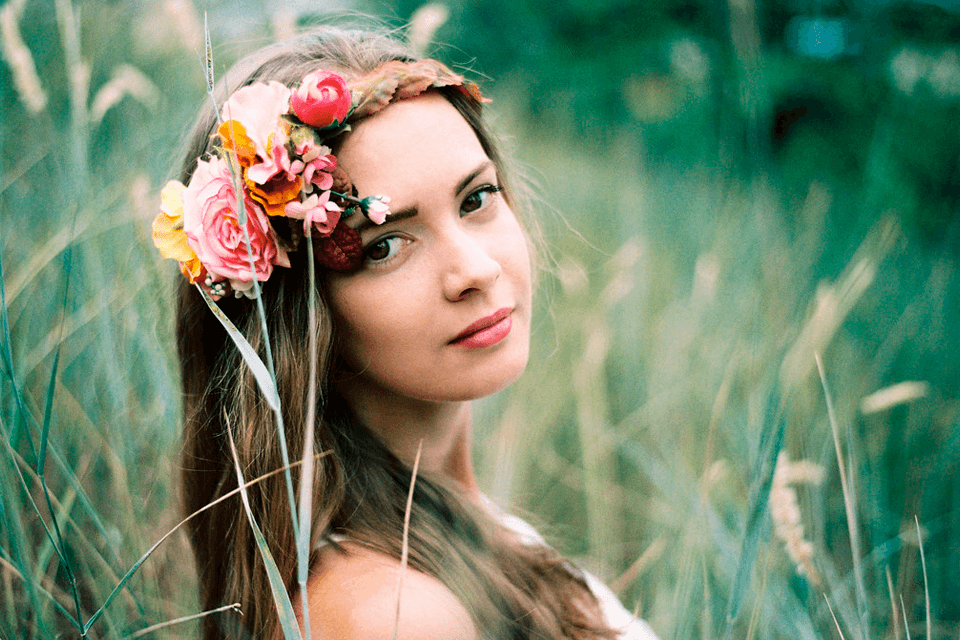
The choice of the best 35mm film may depend on your personal preferences, as well as on the special results obtained after processing. A handy tip is to try out a few available films to see which one gives you the best results, as I have listed the properties of each film and the preferred applications.
Are you after a vintage look or ultra-sharp details? High contrast or psychedelic colors? Different manufacturers specify their own parameters that affect the final shot: grain level, temperature, color tones. Play around, experiment, have fun and see which 35mm film you like the most.
Keep track of the number of exposures. This tells you how many shots you can take with the preferred film. Typically, it is 24 or 36. Just make sure you don’t purchase cheaper film because you think you got a good deal, but then find out that there are only 24 frames in the roll.
Because it is more cost-effective than medium-format film or 120mm roll. A roll of 35mm film has more shots (from 24 to 36) than a roll of medium-format film (12 – 16 shots). There is a wider choice of 35mm film types, making it an easy and convenient choice for film photographers.
Without a doubt, slide film is the most expensive type of film. You probably don’t want to start here. The advantage of using slide film is that you will immediately see the captured image, just like a normal shot. Sometimes it is more difficult to get a slide film, and not all photo studios can develop this type of film.
Many digital photographers are transitioning to film with a black-and-white aesthetic that is more appealing than RAW files converted to digital form. Besides, it the simplest and the most inexpensive film for development at home. Fuji is introducing Instax as the standard of instant films, but their catalog of analog photography is dwindling. The great Agfa company has gone into oblivion, so the nostalgia for discontinued films from rare stocks is strong. When developing expired films, you can get unique artifacts and Instagram filter effects, so their value is in being unpredictable.